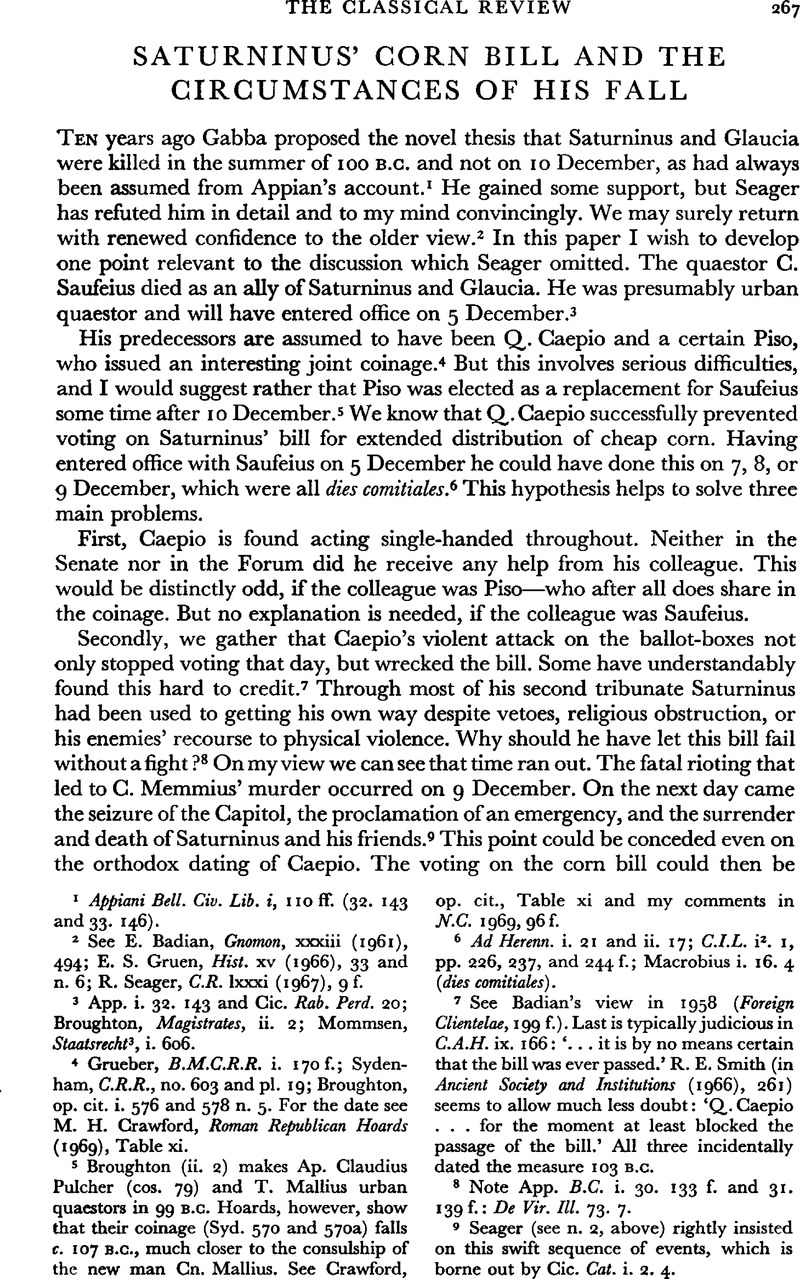Article contents
Saturninus' corn bill and the circumstances of his fall
Published online by Cambridge University Press: 27 February 2009
Abstract

- Type
- Review Article
- Information
- Copyright
- Copyright © The Classical Association 1969
References
page 267 note 1 Appiani Bell. Civ. Lib. i, 110ff. (32. 143 and 33. 146).
page 267 note 2 See Badian, E., Gnomon, xxxiii (1961), 494Google Scholar; E. S. Gruen, Hist. xv (1966), 33 and n. 6; R. Seager, C.R. lxxxi (1967), 9 f.
page 267 note 3 App. i. 32. 143 and Cic. Rab. Perd. 20; Broughton, Magistrates, ii. 2; Mommsen, Staatsrecht 3, i. 606.
page 267 note 4 Grueber, B.M.C.R.R. i. 170 f.; Sydenham, C.R.R., no. 603 and pl. 19; Broughton, op. cit. i. 576 and 578 n. 5. For the date see Crawford, M. H., Roman Republican Hoards (1969), Table xi.Google Scholar
page 267 note 5 Broughton (ii. 2) makes Ap. Claudius Pulcher (cos. 79) and T. Mallius urban quaestors in 99 B.C. Hoards, however, show that their coinage (Syd. 570 and 570a) falls c. 107 B.C., much closer to the consulship of the new man Cn. Mallius. See Crawford, op. cit., Table xi and my comments in N.C. 1969, 96 f.
page 267 note 6 Ad Herenn. i. 21 and ii. 17; C.I.L. i2. 1, pp. 226, 237, and 244 f.; Macrobius i. 16. 4 (dies comitiales).
page 267 note 7 See Badian's view in 1958 (Foreign Clientelae, 199 f.). Last is typically judicious in C.A.H. ix. 166: ‘… it is by no means certain that the bill was ever passed.’ R. E. Smith (in Ancient Society and Institutions (1966), 261) seems to allow much less doubt: ‘Q,. Caepio … for the moment at least blocked the passage of the bill.’ All three incidentally dated the measure 103 B.C.
page 267 note 8 Note App. B.C. i. 30. 133 f. and 31. 139 f.: De Vir. Ill. 73. 7.
page 267 note 9 Seager (see n. 2, above) rightly insisted on this swift sequence of events, which is borne out by Cic. Cat. i. 2. 4.
page 268 note 1 For the 4th as a dies comitialis see C.I.L. i2. 1, pp. 244 f.
page 268 note 2 Probably in 99 B.C. itself, certainly before 26 January 98 B.C.; see Broughton, op. cit. ii. 4 n. 10. In De lege agraria ii. 30. 83 Cicero stresses the loss of Sicilian corn-supplies during the second slave war. Rome even had to feed Sicily!
page 268 note 3 II Verr. iii. 163 and v. 52.
page 268 note 4 The ration was 5 modii in 73 B.C., when the price was still 6⅓ asses. The number of recipients doubtless steadily increased and this was to continue right down to the dictatorship of Caesar. See Tenney Frank, Economic Survey, i. 328 ff.
page 268 note 5 See Cic. Brut. 222 and Off. ii. 72.
page 268 note 6 For Sallust's enigmatic allusion see Maurenbrecher, Historiarum Reliquiae, 29 n. (on Bk. i, frg. 62). For Cicero's evidence see Douglas's excellent note in his edition, 163 f.
page 268 note 7 See Cic. Rab. Perd. 20 f.; App. B.C. i. 33. 146 (did L. Equitius usurp the position of tribune?); Broughton, op. cit. ii. 2 (board of 99 B.C.). Q. Metellus Nepos (cos. 98) and Metellus Pius (cos. 80) campaigned vigorously as privati for Numidicus' recall App. B.C. i. 33 147 f.: Cic. Post. Red. in Sen. 37). C. Cassius (praetor 90 B.C.) was perhaps another tribune of this year.
page 269 note 1 Grueber, op. cit. i. 508 f. (plausibly seeing a Caesarian reference in the rev. type); Syd. no. 943.
page 269 note 2 See Seager, loc. cit. and Sallust, Jug. 37 ff. and 43.
page 269 note 3 App. B.C. i. 32. 142.
page 269 note 4 See Cic. Rab. Perd. 26 and Plut. Pomp. 24; Broughton, op. cit. i. 576; Cic. Brut. 224.
page 269 note 5 Livy, Ep. lxix; Oros. v. 17.
page 269 note 6 App. B.C. i. 32. 142 (προτεθε⋯σησ δ⋯ ὑπ⋯των χειροτον⋯ασ); Plut. Caes. 13; Mommsen, Staatsrecht 3, i. 471 f., 477 ff., and 501–4.
page 269 note 7 Note Oros. v. 17: ‘Saturninus Memmium … fieri consulem timens orta subito seditione fugientem per P. Mettium satellitem informi stipite comminutum interfecit.’
page 269 note 8 Anc. Soc. and Institutions, pp. 263 f.
page 269 note 9 Though Cicero could say of Glaucia even before this point (Brut. 224): ‘nam et plebem tenebat …’
page 269 note 10 See the good remarks of Badian, Foreign Clientelae, pp. 208 ff.
- 3
- Cited by


